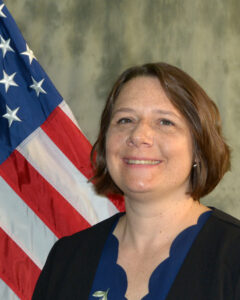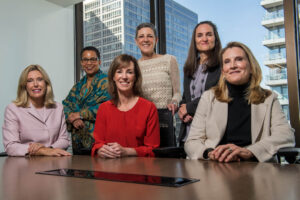What bubbles up when you combine data-driven research from the U.S. Air Force Research Laboratory with the insights and lived experience of a group of female soda executives?
A game-changing understanding of gender in the workplace, and an unlikely alliance that is writing the roadmap for all organizations to win the talent wars…especially when stakes are high.
A Surprising Alliance
AFRL is the center for technology and innovation of the U.S. Air Force. This is where government and civilian experts have come together to shape the last 100 years of aerospace technology innovation.

Genny Cook, Health Scientist at AFRL for over 15 years
Two years ago, a health scientist named Genny Cook observed the senior leadership table at AFRL and noticed there were few women. She used her good standing and trusting relationship with one of the senior leaders to ask “why are there so few women around this important table?” Her question led to action: a self-examination of the gender diversity in the AFRL workforce, including a detailed analysis of promotion and attrition.
The AFRL findings won’t be surprising to most. They uncovered significant gender disparities around organizational pay, promotion and retention.
- Women are underrepresented in the AFRL STEM workforce, making up only 17.5% compared to 82.4% men. This is lower than the overall STEM workforce in the U.S.*
- Women are less likely to be promoted to higher grade levels in AFRL. After controlling for education, age, and veteran status, men were 21% more likely to be of a higher grade level than women.*
- Women were more likely to leave AFRL compared to men. For those hired between 2011-2018, women were 57% more likely to leave AFRL than men during that period.*
*Key findings from “Women in Science, Technology, Engineering, and Mathematics in the United States Air Force Research Laboratory: Factors Associated with Attrition and Promotion,” October 2021
This data rings especially true to the Band of Sisters, six former PepsiCo colleagues who recently co-authored You Should Smile More – How to Dismantle Gender Bias in the Workplace.

The Band of Sisters: Dawn Hudson, Mitzi Short, Katie Lacey, Lori Marcus, Angelique Bellmer Krembs, Cie Nicholson
After years at the food & beverage giant, these executives went on to C-suite and board director roles across 29 industries in the corporate world. Looking back at their careers, they have unique insight into the state of women in the workforce, and a lot to say about how to fix it. But they never guessed their playbook would apply beyond the corporate world.
The two groups connected last year, and as they began to discuss the sources of gender bias and what can be done about it, they quickly converged on common ground.
First, it is clear that women across industries are questioning whether to stay in a system that doesn’t serve them. And importantly, this is a universal leadership imperative. Across corporate C-suites and government command centers, leaders have to pay attention to the potentially surprising factors in their culture that result in valuable diverse talent opting out.
Beyond the Business Case
The Air Force and the Band of Sisters are not the only groups coming to this conclusion. The facts are airtight across industries: having more women in top leadership positions and throughout the organization translates to stronger financial performance and innovation success. The famous McKinsey study, last updated in October 2023, is just one of dozens of quantitative studies that found a significant correlation between gender diversity at the highest levels of an organization and that organization’s profitability, as well as increased revenue from innovation and long-term value creation. Fortunately, AFRL has embraced this compelling evidence, unlike some leaders who dismiss the evidence as the “diversity distraction.”
For AFRL, however, the drive to innovate goes far beyond the typical business case. The national security of the United States depends on such research labs remaining steadfast global leaders in technological innovation. And it’s impossible to unsee the data showing women leaders bailing ship at record rates, leaving a massive void in the leadership pipeline, and a new generation of women watching them and rethinking their paths.
The Common Ground
The AFRL study findings correlated to what The Band of Sisters saw in their own research: the gender gap starts early in their careers, and women can never catch up.
Women entered AFRL at lower grade levels with lower salaries than men. Women in leadership decreased significantly at each grade level (and similarly, white personnel were more likely to achieve a higher rank than minorities). And women were 57% more likely to leave AFRL compared to their male counterparts. Importantly, more women were departing AFRL than were being hired or retained, suggesting both attraction and retention issues.
The Band of Sisters connected the dots, noticing that the reasons why women leave STEM jobs in the government are surprisingly similar to the reasons women leave corporate jobs. Based on their decades of experience across dozens of industries, plus the research for their book, three common factors jump out.
1. The “Little Things” are the Big Thing
The Band of Sisters’ entire thesis is grounded in how the little things of workplace culture matter most; these micro-biases are harder to see but add up over time, and brick by brick the women find themselves behind a wall. We’re talking about all those tiny gestures, double-standards, and micro-aggressions that either build people up or tear them down. Each little thing by itself is too small to mention, but they compound until women tap out, exhausted by the extra effort it takes to be seen and valued. For example, look at the vague, non-specific, style-focused “lazy language” that women hear all the time:
“She’s not a good fit.”
“She’s too emotional.”
“You should smile more.” OR “You should smile less!”
Women across all industries and roles are asked to walk a very narrow balance-beam of acceptable styles between confident and warm, strong

Walking the Double Standard (from You Should Smile More)
enough but not too strong, all while managing the impossible double standard of the likability trap.
Another major category of “little things” radiates from all the extra work that burdens many women, either taking on too much non-promotable, “office housework”, or literally handling most of the home care work.
2. Cracking the Network Code
The research here is eye-opening: the feeling of being excluded or ignored is more damaging than being harassed! No wonder women are burning out, watching men glide forward while they struggle to be seen.

“When the fun’s beginning but you’re left out”
One of the most under-discussed factors in employee satisfaction and retention is access to informal networks. This solution can be extra hard for companies and institutions to address because it is outside of direct channels with employees.
However, its awareness can point leaders to different actions: making sure they are not unknowingly perpetuating unfair access.
Story from the Corporate World:
“I recall at one company a CFO who enjoyed Scotch, and often would invite men from the office to join him after work for a Scotch. He never invited any women.
It was likely very good intent: he assumed the women didn’t like Scotch, or might feel awkward going for drinks, or had to get home to their family.
However, the women noticed that they were missing out on an opportunity to build a relationship with this senior leader who held the purse strings at their company. They saw the men get an advantage that they couldn’t compete with.”
Story from the Government World:
“There was an open house at work where everyone was invited to celebrate a significant organizational accomplishment. I found out later that some of my male coworkers were out in the parking lot having their own side party.
In talking to one of my female coworkers after the fact, she revealed that she was invited to join them but when she saw they were drinking and smoking she ‘got the heck out of there.’
So even when we are invited to the inner circle, we often opt out because the circumstances are inappropriate or exclusive.”
3. The Broken Ladder: the first rung and the top rungs
The barriers to hiring and promotions are like pesky roadblocks on the path to gender diversity. Sometimes referred to as the “broken first rung” syndrome, 87 women to every 100 men make the first step to manager. After that initial gap, women never catch up.
Organizations and institutions need to investigate what happens officially in the hiring and promotion process that puts women on the back foot, since despite equality of representation initially, women are not set up for success at higher levels.

“Not just mentors, get sponsors”
At the senior levels, the factor of mentorship vs sponsorship plays a significant role in getting women to leadership positions.
While women might find willing mentors amongst the few women leaders, organizations must ask themselves if the women are equally connected to the power structure, and if they have equal access to the power players who actively advocate for employees to have stretch assignments or promotion readiness.
Studies show that consciously or unconsciously, the “old boys’ club” is alive and well. The Me-Too movement has unintentionally added an extra layer of caution for men hoping to reach out to women for coaching.
Story from the Corporate World:
“I thought I could just do good work and have the opportunities and promotions follow. It took years for me to realize that those who were advancing quickly were not only doing good work, but they were actively selling their work. They were seeking forums to showcase what they were doing. They were seeking out sponsors. I realized I was missing a trick.”
Story from the Government World:
“When a technical lead is out on leave and needs someone to cover a higher level meeting, they select a back-up in their place. This is a great opportunity for the invitee to get face time with leadership. Often, male colleagues are the ones “chosen” for this duty.
Sometimes the invitee messes up, which is understandable as we are all human. However, if they are male they often get a second chance. If they are female they are often either not given the second opportunity or they don’t accept because they have been ‘burned’ in the past.”
So, What’s a Commander to Do?
(Corporate Executives, take notes)
The research and experience from both teams suggest that the most promising place to start is to set clear goals. AFRL leadership had heard the stories, but now they had the data they needed to take action. AFRL committed to an Diversity, Equity, Inclusion and Accessibility (DEIA) approach that reflects a revised Human Capital Strategy, refined Enterprise Training, and a focus on Workplace Inclusion. This pillar ensures policies and practices are free of bias, and employees feel seen, heard and valued.
So let’s get specific. Here are 5 action steps that can move us all forward:
-
Purge the Lazy Language. If we want to help fix that broken first rung to manager level (and every level above it!) pay extra attention to how performance evaluations are written and given. Leaders should be trained to watch out for lazy language, and should be prepared to probe when they see it. Make language specific, and check for impact. No impact, no problem.
-
Embrace Flexibility: Emphasizing flexibility in work arrangements benefits all genders, and helps to attract the next generation of leaders. The McKinsey study underscores the importance of this aspect in retaining diverse talent.
-
Make Sponsorship accessible: A systemic focus on sponsors, who actively advocate for employees’ advancement, can help overcome barriers to career progression. Companies should develop systems that ensure a diverse range of employees have access to sponsors, reducing dependence on informal networks.
-
Check the first step: Addressing pay discrepancies at hiring could be a game-changer to help women start with equal footing. This is easy to measure.
-
Why are we here: Let’s uncover what makes women stick around in their careers. The allure of communal goals and the draw of public service have proven to be powerful motivators. Look no further than the journey of PepsiCo’s “Performance with Purpose” vision to see how leading with a sense of mission attracts and retains diverse talent. AFRL has a compelling purpose to offer, especially when paired with active support of women in STEM roles.
The Road Ahead
In a world where innovation and progress are paramount, the surprising truth is that gender diversity in leadership is not just a matter of fairness, but a strategic imperative. The findings from the AFRL study, the McKinsey study, and the You Should Smile More thesis offer the key to unlocking untapped talent potential in organizations.
This is a wake-up call for all leaders—an urgent call to action.
When organizations perpetuate a homogeneous leadership landscape, they willingly forfeit the diverse perspectives, fresh ideas, and game-changing innovations that could help us maintain our national security or achieve our business goals.
Instead, by dismantling the everyday barriers of workplace culture, unlocking access to networks, and eliminating the systemic biases that hinder representation in leadership, organizations can tap into an untapped wellspring of talent, fueling innovation and driving unparalleled success.

The Band of Sisters give thanks to our advocates and allies at the AFRL, including:
Erin Pettyjohn – for her leadership and commitment to advancing the mission of AFRL and as Chair of AFWiSE (Women in Science and Engineering)
Genny Cook – for her initiative and collaboration to find the data and tell the stories of Attrition and Promotion at AFRL
Jenn Fielding – for her leadership of AF LitWiSE, and her partnership in finding the common ground between corporate and government gender equity
Marcus Smith – for his courageous leadership in advancing the DEIA agenda for AFRL
JJ Snow – for the thoughtful and purposeful introduction that opened doors to this surprising alliance

